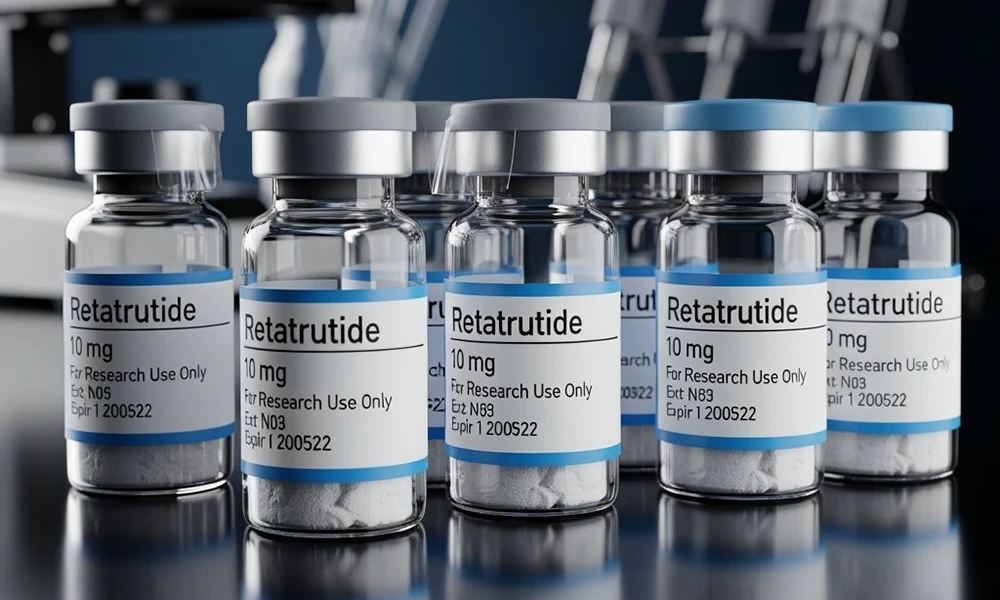Key Takeaways
- Retatrutide is a multifunctional peptide drug that acts as a triple agonist, improving obesity management and metabolic health through regulation of multiple hormonal pathways.
- Clinical trials show retatrutide results in significant weight loss (up to 24.2%) and improved glycemic control, making it a beneficial treatment for obesity and diabetes.
- Retatrutide not only aids in weight reduction but also provides cardiovascular benefits, enhances liver health by reducing liver fat, and maintains a favorable safety profile despite some gastrointestinal side effects.
Wondering what the benefits of Retatrutide are? This comprehensive drug is primarily used to manage obesity and type 2 diabetes through multiple biological mechanisms. In this article, you’ll find information on how Retatrutide benefits aid in substantial weight loss, enhance blood sugar control, boost heart health, reduce liver fat, and improve metabolic functions.
Understanding Retatrutide

Retatrutide is a multifunctional peptide drug used primarily for managing obesity and related health issues. This medication represents a pivotal advance in obesity management, addressing unmet needs in the treatment landscape. Unlike traditional therapies that target a single pathway, retatrutide works through multiple mechanisms to deliver superior outcomes.
The primary application of retatrutide is weight loss and improving overall health. It belongs to the class of peptide therapies, functioning as a triple agonist to stimulate various hormonal pathways. This unique approach not only aids in reducing body weight but also enhances metabolic health, making it a comprehensive solution for individuals struggling with obesity and diabetes.
Next, we’ll explore retatrutide’s intricate mechanism of action and how it targets multiple receptors to achieve remarkable results.
Mechanism of Action
Retatrutide operates as a triple agonist, effectively stimulating GLP-1, GIP, and glucagon receptors. This multifaceted approach is a significant departure from traditional therapies that primarily focus on a single pathway. Activating GLP-1 receptors helps retatrutide reduce appetite and increase satiety, crucial for weight management. This mechanism is part of what makes retatrutide effective in treating obesity. Additionally, the use of triple agonists further enhances the therapeutic potential in this area.
The activation of GIP receptors by retatrutide promotes glucose dependent insulinotropic polypeptide insulin secretion and insulin release in response to food intake, significantly improving glycemic control. Meanwhile, glucagon receptor stimulation aids in increasing glucose production during fasting periods, ensuring balanced glucose homeostasis throughout the day. This comprehensive approach targets multiple hormonal pathways for enhanced metabolic control, including dependent insulinotropic polypeptide gip and gastric inhibitory polypeptide.
Binding to these three receptors allows retatrutide to effectively regulate body weight and improve metabolic health. We will now explore the tangible benefits of this drug, starting with its impact on weight reduction.
Significant Weight Reduction

Retatrutide has shown remarkable results in significant weight reduction and overall metabolic health improvement. Clinical studies have shown that retatrutide dosage ranges from 5 mg to 15 mg are associated with substantial weight loss outcomes. Participants on the highest dose experienced an average weight loss of 24.2%, a testament to the drug’s efficacy.
In clinical trials, the weight loss percentages varied significantly depending on the dosage. For instance, the 1 mg group reported a 7.2% weight loss, while the 12 mg group saw an impressive 17.5% reduction in body weight at 24 weeks. These reductions make retatrutide a game-changer in weight management, offering hope to those who have struggled with other treatments.
Retatrutide’s weight loss results are particularly noteworthy when compared to other therapies. For example, DPP-4 inhibitors are generally weight-neutral, while retatrutide achieved significant weight loss outcomes. This makes it a superior option for those seeking effective weight management solutions.
The impressive weight loss results are not just numbers on a scale; they translate to real-world benefits such as reduced body mass index (BMI) and improvements in conditions like obstructive sleep apnea. Next, we’ll discuss how these weight reduction benefits also contribute to improved glycemic control.
Improved Glycemic Control

One of the standout benefits of retatrutide is its ability to improve glycemic control, a critical factor in managing diabetes. The drug has been shown to lower fasting plasma glucose levels, making it a valuable tool for individuals with diabetes. This improvement in glycemic control is closely linked to the weight reduction benefits discussed earlier.
Retatrutide also improves biomarkers related to insulin resistance, including:
- Significantly reducing fasting serum insulin concentrations among participants, indicating enhanced insulin sensitivity, which is crucial for metabolic health.
- Increasing levels of adiponectin.
- Decreasing levels of leptin, suggesting a more balanced metabolic state.
Improvements in metabolic health extend beyond just glycemic control. Participants also saw favorable changes in lipid profiles and reductions in liver inflammation. These multifaceted benefits make retatrutide a comprehensive solution for improving overall metabolic health.
Cardiovascular Benefits

Retatrutide offers significant cardiovascular benefits, making it an attractive option for individuals with obesity and related cardiovascular risk factors. Clinical trials have shown that retatrutide leads to significant reductions in both systolic and diastolic blood pressure. This is a crucial benefit, as high blood pressure is a common comorbidity in people with obesity and diabetes.
In addition to lowering blood pressure, retatrutide treatment has resulted in notable decreases in total cholesterol levels and improvements in lipid profiles. These changes contribute to overall cardiovascular health, reducing the risk of cardiovascular disease.
We will now delve into how retatrutide impacts liver fat and metabolic health.
Effects on Liver Fat and Metabolic Health
Retatrutide has been shown to significantly lower liver fat levels, providing a crucial benefit for individuals with obesity and metabolic disorders. Clinical studies indicate that retatrutide may help reverse non-alcoholic fatty liver disease (NAFLD) by reducing fat accumulation in liver cells and non esterified fatty acids. This is particularly important as NAFLD is a common condition among people with obesity.
The treatment for 24 weeks led to substantial reductions in liver fat content across all dosage levels, with a mean relative change from baseline of up to -82.4% for the highest dose. At this highest dose, 86% of participants achieved normal liver fat levels after 24 weeks of treatment, indicating improvements in hepatic steatosis. These results underscore the drug’s efficacy in improving liver health.
Reductions in liver fat content were closely linked to decreases in body weight and abdominal pain and fat. This indicates that the benefits of retatrutide extend beyond weight loss to include significant improvements in metabolic health. We’ll now explore the clinical trials and efficacy data supporting these findings.
Clinical Trials and Efficacy
The clinical trials for retatrutide have consistently demonstrated its efficacy in weight loss and metabolic health improvement. Phase II trials indicated significant weight loss and improved metabolic markers, underscoring the drug’s potential. These trials have shown that retatrutide is effective in adults with obesity and type 2 diabetes, providing a valuable treatment option.
Current Phase III trials, including the TRIUMPH studies, are assessing the long-term safety and efficacy of retatrutide in various patient groups. These ongoing studies involve over 4,500 participants across multiple sites, aiming to provide comprehensive data on the drug’s benefits and risks.
The robust data from these trials highlight the superior efficacy of retatrutide shows promise compared to other treatments. Next, we’ll discuss the efficacy and safety, as well as the adverse effects and safety profile of this promising drug.
Adverse Effects and Safety Profile
Retatrutide has demonstrated a remarkable safety profile in clinical studies. However, like all medications, it is not without side effects. Common adverse effects are nausea and dizziness. Diarrhea is also frequently reported. These gastrointestinal issues, including vomiting and abdominal distention, were among the most frequently reported in Phase I trials.
The intensity of these adverse effects is typically dose-related, with higher dosages associated with more severe symptoms. Despite these side effects, the overall safety profile of retatrutide remains favorable, with additional Phase III trials needed to further evaluate its long-term effects and any potential adverse events.
Understanding the potential side effects is crucial for both patients and healthcare providers. We’ll now discuss the importance of personalized dosage and administration to optimize the benefits of retatrutide while minimizing adverse effects.
Personalized Dosage and Administration
Personalized dosage plans are essential for achieving optimal weight loss outcomes with retatrutide. The typical process includes:
- Starting dose with a dosage of about 2.5 mg taken weekly.
- After several weeks on the initial dosage, physicians may suggest a gradual increase based on individual response, ensuring that at least one dose is effective.
- This process, known as dose escalation, ensures that the treatment is tailored to each person’s needs.
The maintenance dose helps sustain weight after achieving initial weight loss goals, ensuring long-term success. Regular consultations with healthcare providers are important for effective dosage adjustments based on individual reactions. Factors such as body weight and metabolism can significantly influence the necessary dosage for each individual.
Finding the right dosage is crucial for effective treatment. Variations in dosage can occur based on weight loss goals and individual reactions, making a personalized approach essential for optimal effectiveness. We’ll now compare retatrutide with other therapies to highlight its unique benefits.
Comparison with Other Therapies
Retatrutide stands out due to its superior efficacy at lower doses compared to other dual agonists and single receptor agonists. Compared to therapies like semaglutide and tirzepatide, retatrutide offers promising results in improving metabolic health. The unique action of retatrutide on GLP-1, GIP, and glucagon receptors suggests it could be effective in addressing multiple metabolic disorders.
Furthermore, retatrutide has been observed to benefit cardiovascular parameters in individuals with pre-existing cardiovascular diseases. These advantages make retatrutide a compelling option for those seeking comprehensive treatment for obesity and diabetes.
Next, we’ll explore future perspectives and ongoing studies.
Future Perspectives

The ongoing studies are designed to assess both short-term and long-term safety outcomes of retatrutide. These studies aim to evaluate the drug’s efficacy in diverse populations, including those with different comorbidities. This comprehensive approach ensures that retatrutide’s benefits can be widely applied.
Further exploration of its effects in different conditions is needed to widen the impact of retatrutide’s effects. As the increasing prevalence of obesity and diabetes continues to rise globally, retatrutide represents a significant advancement in addressing the global burden of these health challenges.
Support Your Weight Loss Journey Today
Whether you’re taking GLP-1 medications or seeking a powerful standalone solution, the PatchMD GLP-1 Support Patch is designed to complement your efforts naturally. With ingredients that support appetite control, blood sugar balance, and metabolic function, our patch offers an easy, gut-friendly alternative.
Try the GLP-1 Support Patch now and experience the difference:
Summary
Retatrutide has proven to be a groundbreaking advancement in the treatment of obesity and diabetes. Its multifaceted approach, targeting GLP-1, GIP, and glucagon receptors, has demonstrated significant weight reduction, improved glycemic control, and cardiovascular benefits. These comprehensive benefits make retatrutide a promising option for individuals struggling with obesity and related metabolic disorders.
As ongoing studies continue to evaluate its long-term efficacy and safety, retatrutide’s potential to transform obesity and diabetes therapy becomes increasingly clear. This drug offers hope to millions, paving the way for a healthier future. Embrace the possibilities that retatrutide brings and take a step towards a healthier, happier life.
Frequently Asked Questions
Meet the Author

Bradley Keys
Bradley Keys is an accomplished writer who has covered a wide variety of health, nutrition, and wellness topics. He graduated with a Bachelor of Science from Florida State University, and has extensively explored a diverse range of subjects within the realms of health, wellness, and nutritional supplementation, showcasing a broad and in-depth understanding of these interconnected fields.
Reviewed by :

Dr. Majid Sabour
Dr. Majid Sabour, MD, is a renowned expert in medical weight loss and the founder and medical director of Gent's Doctor clinic in Beverly Hills, California. With over 25 years of experience, Dr. Sabour is board-certified in family medicine and specializes in helping patients achieve their weight loss goals through personalized medical treatments. He graduated from Zaporizhzhia State Medical University in Ukraine and completed a family medicine residency program with Columbia University and Cornell at New York-Presbyterian Hospital in Manhattan. Licensed in both New York and California, Dr. Sabour is dedicated to providing comprehensive weight loss solutions that promote overall health and well-being.












